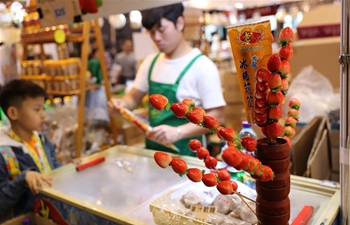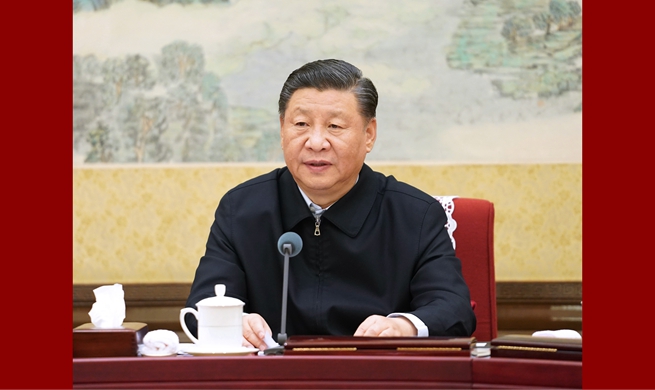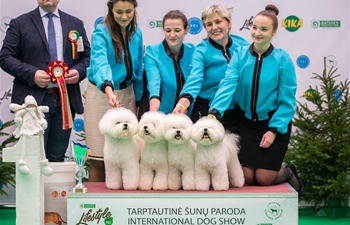BEIJING, Dec. 29 (Xinhua) -- Sun Yong is no night owl, but on Nov. 28, the 25-year-old public servant in south China's Guangdong Province traveled to the provincial capital of Guangzhou, joining hundreds of others as they queued through the night outside a downtown shopping mall.
What had Sun waiting in line for nearly 20 hours was not a new iPhone, but the pop-up release of the Air Force 1 "Black Silk," a pair of sneakers by Hong Kong-based fashion brand CLOT in collaboration with Nike and Japanese label Fragment Design.
As one of the most discussed new releases in the sneaker world in 2019, Black Silk is characterized by its silk upper inspired by traditional Chinese textiles, and the traditional Chinese-style patterns underneath the silk outer layer.
"I like the silk upper design because it represents something very Chinese," said Sun. "I also like the sneakers CLOT released last year with the Terracotta Warriors design. It looks like a piece of art."
As China's economy booms and the country opens up, Chinese people have embraced Western notions of fashion. But an increasing number of Chinese like Sun are now looking to Chinese designs and products with Chinese elements for their fashion choices.
There's no clear definition of what counts as Chinese elements in the fashion industry, but they generally involve traditional Chinese aesthetics or designs with Chinese cultural connotations.
RISE OF "GUOCHAO"
The phenomenon is described by Chinese media as the rise of "guochao," or literally "Chinese fashion trend." The word guochao used to simply refer to Chinese streetwear brands, but since 2018, it has grown into a new notion representing the consumption of Chinese-style fashion products.
The watershed year was marked by Chinese sportswear label Li-Ning's presentation at the New York Fashion Week, where the brand showcased hoodies with "China Li-Ning" written in Chinese characters stitched on the front and sneakers inspired by traditional Chinese philosophy.
Sales soon took off. In 2018, Li-Ning's revenue amounted to 10.5 billion yuan (about 1.5 billion U.S. dollars), representing an increase of 18.4 percent year on year.
"I used to buy Nike and Adidas for sporty looks, but now my wardrobe is filled with Li-Ning products," said Ping Fan, a 32-year-old medical worker living in Hangzhou.
"I think the Chinese-style designs are very cool, and I've spent maybe 7 or 8 thousand yuan on Li-Ning clothes over the last couple of months," Ping said.
About 13 percent of the young generation in China consider Chinese elements to be a major factor when purchasing fashion products, according to a survey conducted by Chinese fashion site Luxe.co, which polled about 3,000 young Chinese consumers.
According to data from Xiaohongshu, an Instagram-like Chinese fashion and lifestyle sharing platform, in the first half of the year, content related to Chinese fashion products has increased by 116 percent year on year, and over 5 million users have shared information about Chinese fashion products over the period.
Not only fashion companies are riding the wave. The Palace Museum, one of the most visited museums in the world, also rolled out its collection of cosmetic products inspired by traditional Chinese architecture or astrology. Its official online stores selling Palace Museum-themed cultural products have over 10 million followers.
"The rise of guochao has become a new driver of economic growth and will facilitate industry upgrading as Chinese companies and brands are making more products with both functionality and cultural value," said Professor Hu Yu, executive director of the Institute for Culture Creativity at Tsinghua University.
CULTURAL CONFIDENCE
For Chinese consumers, the new trend is more than just a question of money.
"I'm a huge fan of Chinese period dramas, and that's why I also like cosmetic products featuring traditional Chinese designs," said Zhang Saisai, a 25-year-old media worker, who is a regular consumer of Palace Museum-themed eye shadows and lipsticks.
"I think incorporating Chinese elements in cosmetic products is a good way to promote Chinese culture and to make it popular among young people," she said.
"We used to see many Chinese wear clothes with English words on them, but now more young people in China are wearing Chinese characters. I think it's a good thing," said Ping Fan.
"I also wear my Li-Ning sweatshirts when traveling abroad because I think it's cool to let foreign people see the Chinese characters on my clothes and it somehow makes me proud," she said.
"Young Chinese consumers today want more products with a personal twist, and they want the products they purchase to express their cultural confidence," said Du Yanbing, vice secretary-general of the China National Garment Association.
"With their inherent cultural confidence, the young generation in China now want products related to their cultural identity," said Hu Yu.
BETTER UNDERSTANDING NEEDED
To woo Chinese consumers, foreign fashion brands are also jumping on the bandwagon, adding Chinese elements to their product collections.
One month ahead of the Chinese Lunar New Year - the Year of the Rat, foreign brands including Gucci and Rolex have already rolled out their new products with rodent designs.
But the attempts of foreign fashion labels are often met with muted or sometimes awkward market reactions.
"Brands have to understand Chinese culture to make good Chinese-style designs. You can't just put an animal or flower on your products and say that represents China," said Sun Yong.
"Sometimes the Chinese New Year sneakers made by foreign companies remind me of the shoes corpses wear at their funerals in China," said Hao Yupeng, a veteran sneaker-lover in Beijing.
"Foreign brands need to understand the values of Chinese culture to make their designs work, but it is also the responsibility of the Chinese fashion industry to go out more and promote exchanges with foreign counterparts to enhance that understanding," said Hu Yu.

















